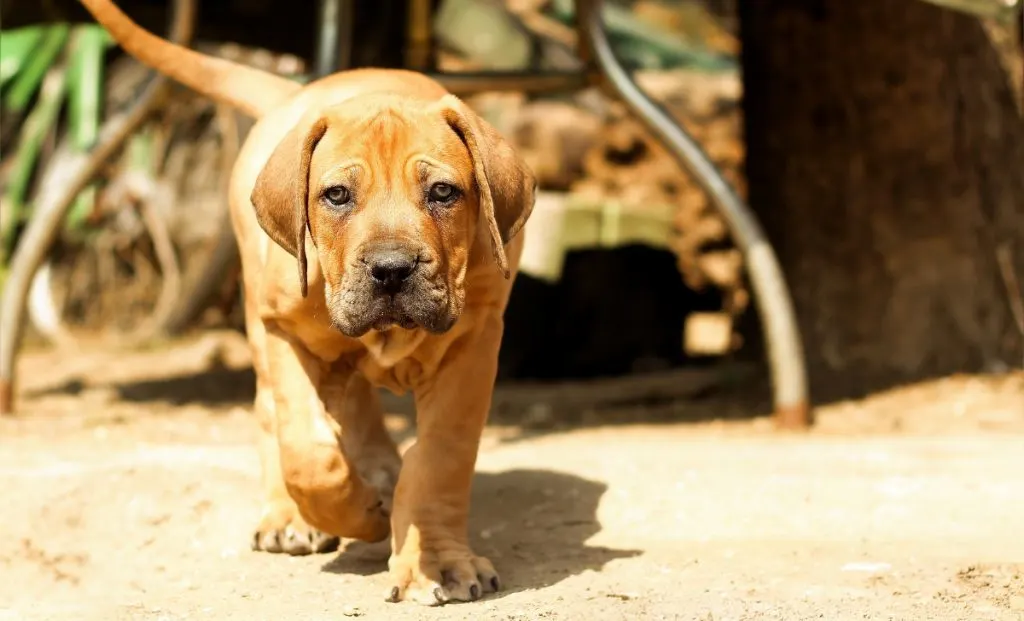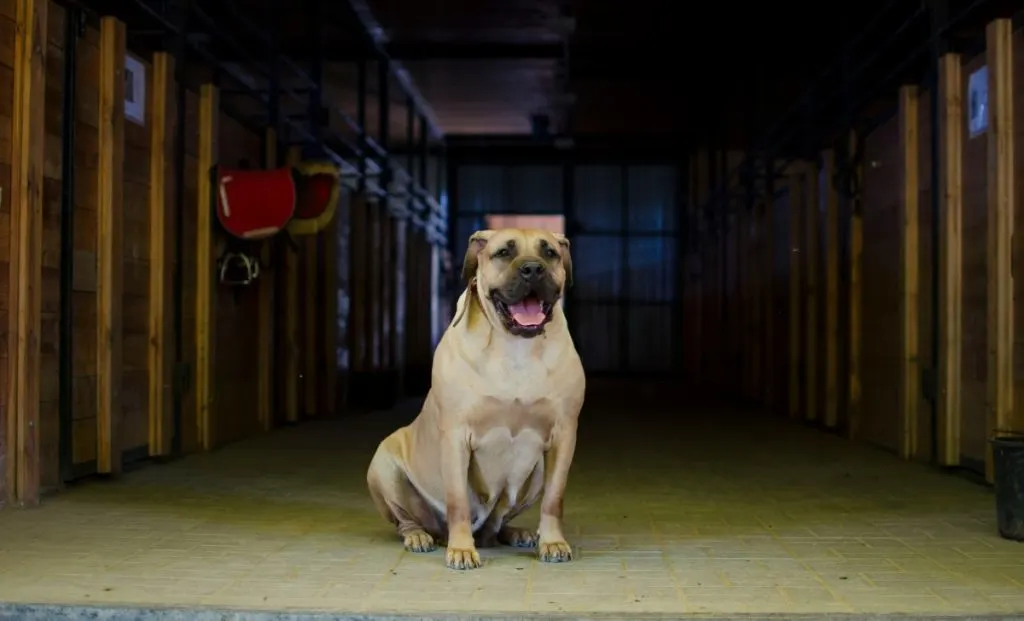When it comes to our gentle giants, the Boerboel, their growth, health, and happiness start with what’s in their bowl.
Let me introduce you to the ultimate Boerboel Feeding Chart! This is your go-to guide for nurturing your mighty protector from a bumbling pup to a majestic adult.
If you are a new dog parent and looking to refine your furry friend’s diet, you’ve stumbled upon the perfect resource.
No time to waste! Let’s get going and better understand the dietary needs of these remarkable dogs. By doing so, we will make sure they receive the love and care they deserve.
After all, love for your pup can be shown through every scoop of their meal!
Boerboel Feeding Chart Overview
Diving into the Boerboel feeding chart can be both exciting and a tad overwhelming. But fear not!
Our quick overview is here to demystify the process. It is quite simple. As a responsible pet parent, your goal is to make sure your gentle giant gets the right nutrition at every leap of their life.
So, before we really get into it, here is a quick table:
| Life Stage | Age Range | Meals Per Day | Cups Per Meal |
|---|---|---|---|
| Puppy | 0-4 months | 4 | 2-3 cups |
| Yount Puppy | 4-6 months | 3 | 2.5 – 3.5 cups |
| Older Puppy | 6-12 months | 2-3 | 3-4 cups |
| Adolescent | 12-18 months | 2 | 4-5 cups |
| Adult | 18 months+ | 2 | 4-6 cups |
| Senior | 7 years+ | 2 | 3.5-4.5 cups |
As you may have figured, these are general guidelines. The exact amount can vary based on the dog’s weight, activity level, and the specific brand of food. Remember to always consult with your vet for personalized advice.
One thing to keep in mind throughout the whole article is that, clumsy puppy stage to their majestic adult years, your Boerboel’s dietary needs will change, and so should their meals.
Boerboel Puppy Feeding Chart

The South African Boerboel puppy, even as young as a couple of days, is still a mighty dog! Usually, Boerboel male pups tend to be a bit bigger than the females, but both need the best food possible.
Let’s check out what the best diet is for a 3 week old puppy, shifting gradually to a period when this dog reaches a few months of age.
Early Nutrition (Birth To 3 Weeks)
From the moment a Boerboel puppy enters the world, their first meals set the stage for a lifetime of health and vitality. And, I am not even exaggerating!
You see, the initial nourishment these puppies receive comes directly from their mother’s milk. This is particularly a special type called colostrum.
Within the first hours and days of life, colostrum plays a very important role. This kind of milk is packed with antibodies and nutrients that are essential for strengthening the puppies’ immune systems.
Even the best dog food in the world cannot replace this natural elixir that does wonders to a pup’s body.
This golden window of feeding on colostrum is, therefore, crucial. It lays the good foundation for the pup’s ability to fight off infections and grow into robust, healthy dogs.
Boerboel puppies typically nurse from their mothers for about eight weeks. This can differ, depending on the individual pup. Some nurse longer, some even shorter.
During this stage, it’s important to monitor for any unusual behaviors, including the distressing occurrence of a mother dog hurting her pups.
While rare, this can happen due to stress, confusion, or health-related issues.
Weaning Process (3 To 8 Weeks)
Typically starting around four to six weeks of age, weaning is the gentle shift from mother’s milk to puppy mush and eventually, to regular puppy kibble.
Puppy mush, a blend of high-quality puppy food soaked in water or puppy milk replacer.
This soft food is easy for the little ones to lap up and digest. They gradually get accustomed to the texture and taste of solid food. As they grow, the consistency of the mush can be slowly reduced until they’re ready to handle dry dog kibble.
Switch foods gradually. This is vital for a few reasons. First, it supports the puppies’ developing digestive systems, allowing them to adjust without causing undue stress. And boy, do these big puppies have a lot of growth spurts!
Rapid growth spurts in breeds like the Boerboel mean their dietary needs are constantly changing. Of course, this requires careful attention – we must make sure they’re receiving the right balance of nutrients.
However, this period can also bring about challenges, such as puppy diarrhea. It normally occurs because their bodies are adjusting to new foods.
That said, diarrhea can be a normal part of the Boerboel puppy weaning process.
But, it’s important for owners to monitor their puppies closely. If diarrhea persists, it’s a warning sign to consult a veterinarian, as young puppies can become dehydrated quickly.
Growing Fast (6 – 12 Months)
By the time they are six months to a year old, your Boerboel is now in the peak of their teen months. This is the period when pups are experiencing rapid growth spurts and requiring adjustments in their diet to match their changing needs.
You see, as your Boerboel puppy grows, so does their appetite.
With that being said, it’s essential to balance their food intake to prevent overfeeding. You do not want obese Boerboels. Instead, you want to make your pup experience a good relationship with food.
Typically, feeding them twice a day is recommended, with portion sizes adjusted according to their weight, growth chart, and activity level.
During this period, you might experiment with different dog food brands, to figure out which one suits your pup best.
Watch for signs of allergic reactions, intolerances, or digestive issues, and be prepared to adjust their diet as needed.
In case you thought about it, incorporating raw foods into your Boerboel’s diet can start in these teenage months. It could offer a variety of proteins and nutrients. But we will get to that a bit later.
Remember to always consult with your vet if you are in doubt about whether your feeding plan meets your puppy’s nutritional needs.
Boerboel Adult Feeding Chart

As your Boerboel steps into adulthood, you want them to have all the good stuff – proteins, healthy fats, carbs, vitamins, and minerals. But in just the right amounts to keep them healthy without tipping the scale towards weight gain.
Since they’re not as speedy with their metabolism as when they were pups, it’s all about portion control.
For adult dogs, from around eighteen months to seven years, twice a day feeding is also recommended.
Think about 4 to 6 cups of high-quality adult food per day.
Divide their daily grub into regular meals that match their size and how active they are, rather than letting them munch away all day (no free-feeding, okay?).
Try mixing things up with some high-quality kibble, maybe even a bit of raw meaty bones if that suits them. Of course, all under your vet’s advice.
The key is to keep meals exciting and healthy for your, now full-grown, Boerboel.
High-quality, nutrient-dense foods specifically formulated for large breeds are ideal.
Boerboel Senior Adult Feeding Chart

Boerboels reach old age when they are around eight years old. They might be among the dog breeds with the shortest lifespan, but that does not mean their bowls should be short of food!
At this age, their metabolism isn’t what it used to be, and they’re not as keen to run around all day. Seniors may even have low appetite when compared to pups.
They need fewer calories because they’re not burning energy like they used to, but still need the good stuff.
Quality protein to keep their muscles strong, fiber to keep things moving smoothly, and a nice mix of fats and carbs to keep their energy up without packing on the pounds.
Feeding senior Boerboels twice a day is recommended. The portion sizes should be adjusted to their reduced energy needs to avoid weight gain.
The exact amount depends on their size, activity level, and specific dietary requirements.
A general guideline is about 2.5 to 4.5 cups of high-quality, low-calorie senior dog food per day, divided between the two meals.
With senior Boerboels, it’s more about watching out for those age-related health issues like arthritis, hip dysplasia, or a bit of extra weight.
With that in mind, your vet might prescribe a special diet, depending on the health status of your doggo.
Nutritional Requirements Of A Boerboel
Making sure your Boerboel receives a balanced diet packed with the natural components is super important for their health, vitality, and longevity.
Just like us, dogs need a variety of nutrients to function optimally. Each nutrient plays a unique role in their bodily functions.
Keep in mind that the quality and source of these nutrients can make a big difference in their overall health.
Let’s break down these essentials, starting with one of the most critical components: protein.
Protein
Why is protein vital?
Protein is the building block of your Boerboel’s diet. It is essential for the dog’s muscle development, repair, and overall growth. It’s also crucial for maintaining a healthy immune system and supporting various bodily functions.
Being large and active dogs, and carnivores, Boerboels require diets higher in protein than some other breeds.
The exact amount can vary based on age, activity level, and health status. There are lots of types of dog food on the market that are made for different doggie age groups.
Well, a good rule of thumb is to look for foods where protein constitutes about 20% to 30% of the diet for adults and at least 22% to 32% for puppies and adolescent dogs, as they’re still growing.
The source of the protein in your dog’s food is as important as the amount.
When inspecting food labels, the first main ingredient listed should be a specified meat source (e.g., “chicken” or “beef” rather than “meat” or “poultry”).
This means the food is made with a substantial amount of real meat. Therefore, look for high-quality animal proteins that should be at the top of the ingredient list.
These include meats like chicken, beef, lamb, and fish. Each offers a different profile of essential amino acids, which are the building blocks of proteins.
Fatty Acids
Transitioning to the topic of fatty acids, these are also among the crucial components of a Boerboel’s diet. In fact, they are pivotal at every stage of their life for various reasons.
Firstly, fatty acids, especially omega-3 and omega-6 fatty acids, are great for maintaining a healthy coat, supporting cardiovascular health, improving inflammatory responses, and enhancing cognitive functions.
Beyond aesthetics, these nutrients are important for brain development in puppies.
Boerboels benefit from a diet rich in fatty acids from puppyhood through to their senior years.
Puppies, in particular, need a good supply of omega-3 fatty acids for brain development and to support their rapid growth.
As adults and seniors, these nutrients help maintain their health, coat condition, and joint flexibility.
High-quality animal-based fats are excellent sources of omega-6 fatty acids, while omega-3 fatty acids are primarily found in fish and flaxseed.
Look for ingredients like fish oil, salmon, flaxseed, and canola oil in dog foods. These are indicative of a good balance of essential fatty acids.
Carbohydrates
Moving on to another important component in your Boerboel’s diet.
Carbohydrates in a dog’s diet, including for Boerboels, can be a topic of much debate among pet owners and experts alike.
While dogs do not technically require carbohydrates to survive, these nutrients can play a beneficial role in their overall diet when chosen carefully and fed in appropriate amounts.
Carbs provide a quick source of energy for your pup. They help in the proper functioning of the intestines. They can also be a good source of essential nutrients and fiber.
We can see that carbs are often included in dog foods as grains, vegetables, and fruits. Reason being, they offer a balanced source of energy and contribute to overall health.
Grain-Free Or Not?
Grain-free diets have become popular, but it’s important to note that not all dogs require a grain-free diet, and such diets are not inherently superior.
The question of whether to feed a Boerboel a grain-free diet or not is less about the necessity of carbohydrates and more about the type and quality of the carbs and the individual dog’s health needs.
Some dogs might have allergies or sensitivities to certain grains, which makes a grain-free diet a better choice for them.
However, it’s important to replace grains with high-quality carbohydrate sources. Think sweet potatoes or legumes.
This way you will ensure your big pup still receives the necessary energy and nutrients.
Supplements For Your Boerboel
Sometimes, your Boerboel might need a little extra help in the health department that their regular dog food just can’t give them.
Maybe their joints are getting stiff, or their coat isn’t as shiny as it used to be, or their tummy acts up more than you’d like.
That’s where supplements come into play. For example, fish oil is good for a glossy coat and less itchiness. Glucosamine helps keep those big bones moving smoothly.
For Boerboels, some go-to supplements include things for joint health, like glucosamine, and omega-3s for keeping their coat sleek and their skin calm. Probiotics are also great for keeping their digestion on track.
But don’t just start tossing supplements into their bowl without chatting with your vet first. Your vet can point you to the good stuff that actually works and tell you how much to give.
And remember, supplements are the cherry on top, not the main course.
A solid, balanced diet is what keeps your Boerboel in tip-top shape. Not to mention that lean body condition!
Supplements are just there to fill in the gaps. Think of it like this: good food first, supplements second.
Raw Diet For Boerboels
Often referred to as Biologically Appropriate Raw Food (BARF), raw diet is a feeding regimen that has gained popularity among dog owners, especially for large breeds like Boerboels.
As you have guessed it, this diet focuses on feeding dogs raw meats, bones, fruits, and vegetables. Basically mimicking what they might eat in the wild.
Here, we’ll explore the raw feeding benefits and disadvantages for Boerboels, and consider how it fits into a balanced nutritional plan.
Pros
Lots of pet parents who are feeding their dogs raw food argue that it is more in tune with what dogs would naturally eat in the wild, potentially leading to better health outcomes.
Of course, it consists of completely natural components without any additives. The natural, healthy fats found in a raw food can contribute to a shinier coat and healthier skin.
What dog owners like is that feeding raw allows them to have complete control over what their dog is eating. This can be especially beneficial for dogs with allergies or sensitivities.
Many dogs find raw diets more palatable compared to commercial pet food, which can be beneficial for picky eaters. But, they still go crazy for commercial treats!
When it comes to chewing on raw bones, this can help reduce tartar build-up and promote healthier teeth and gums. That’s a plus for sure!
Cons
Alright, time for some cons.
One of the major risks of a raw diet is bacterial contamination.
Raw diets carry the risk of bacterial contamination, such as Salmonella, especially in raw chicken meat.
This can affect both dogs and humans in the household. Most likely the reason why we don’t eat raw meat at home!
Other major risks include the potential for nutritional imbalances.
You see, commercial pet foods are formulated to meet all of a dog’s nutritional needs. This can be challenging to replicate with homemade raw diets.
While bones may be good for dental health, feeding whole bones can also pose a risk of choking or causing internal punctures.
With all that in mind, the best thing is to check with your vet if you want to transition your Boerboel to BARF.
Most owners find the raw diet rather expensive. It can be time-consuming and often more expensive than feeding commercial dog food.
If not fully committed to switching to a raw diet, incorporating some raw elements into a Boerboel’s diet can be beneficial.
For example, adding raw meats or vegetables to high-quality commercial kibble can enhance the diet’s nutritional value and enjoyment for the dog.
The Key To A Healthy Boerboel
Wrapping the Boerboel feeding chart all up, the secret sauce to a thriving pup really isn’t so secret after all. It’s all about the love and care we pour into their every meal!
When it’s time to switch up their menu, remember to take it slow and steady, giving your Boerboel plenty of time to adjust.
Choosing top-notch grub is crucial, but equally important is watching how your gentle giant reacts to their new diet. Stick to these principles, and you’re sure to have a healthy canine companion for years to come!

Meet Iram, a devoted veterinarian, passionate dog lover, and current Ph.D. candidate at Utrecht University in the Netherlands. Seamlessly blending her roles as a vet and content writer, Iram channels her love for dogs into heartfelt narratives.
Since childhood, Iram nurtured a dream of becoming a vet, a passion that runs deep in her family. Having now fulfilled that dream, she’s eager to share her acquired knowledge. In her writing, Iram not only explores the emotional bond between humans and their canine friends but also integrates her veterinary expertise, offering readers a holistic understanding of their beloved pets.
